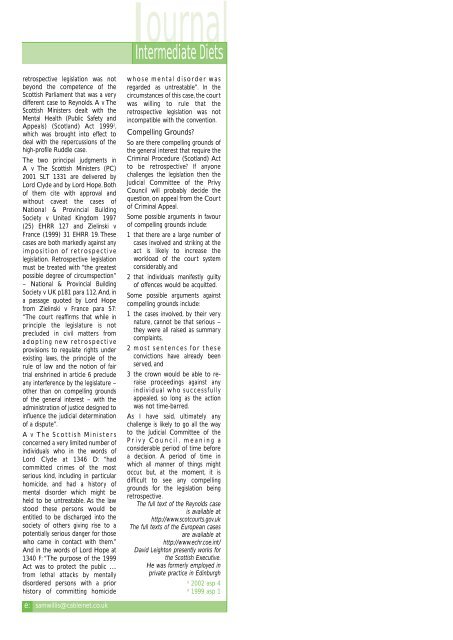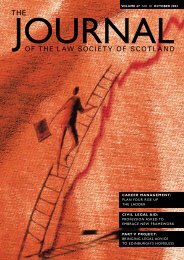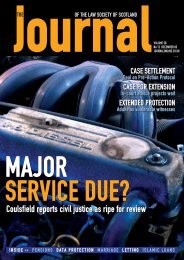OF THE LAW SOCIETY OF SCOTLAND - The Journal Online
OF THE LAW SOCIETY OF SCOTLAND - The Journal Online
OF THE LAW SOCIETY OF SCOTLAND - The Journal Online
You also want an ePaper? Increase the reach of your titles
YUMPU automatically turns print PDFs into web optimized ePapers that Google loves.
etrospective legislation was not<br />
beyond the competence of the<br />
Scottish Parliament that was a very<br />
different case to Reynolds. A v <strong>The</strong><br />
Scottish Ministers dealt with the<br />
Mental Health (Public Safety and<br />
Appeals) (Scotland) Act 19992 ,<br />
which was brought into effect to<br />
deal with the repercussions of the<br />
high-profile Ruddle case.<br />
<strong>The</strong> two principal judgments in<br />
A v <strong>The</strong> Scottish Ministers (PC)<br />
2001 SLT 1331 are delivered by<br />
Lord Clyde and by Lord Hope. Both<br />
of them cite with approval and<br />
without caveat the cases of<br />
National & Provincial Building<br />
Society v United Kingdom 1997<br />
(25) EHRR 127 and Zielinski v<br />
France (1999) 31 EHRR 19. <strong>The</strong>se<br />
cases are both markedly against any<br />
imposition of retrospective<br />
legislation. Retrospective legislation<br />
must be treated with “the greatest<br />
possible degree of circumspection”<br />
– National & Provincial Building<br />
Society v UK p181 para 112.And, in<br />
a passage quoted by Lord Hope<br />
from Zielinski v France para 57:<br />
“<strong>The</strong> court reaffirms that while in<br />
principle the legislature is not<br />
precluded in civil matters from<br />
adopting new retrospective<br />
provisions to regulate rights under<br />
existing laws, the principle of the<br />
rule of law and the notion of fair<br />
trial enshrined in article 6 preclude<br />
any interference by the legislature –<br />
other than on compelling grounds<br />
of the general interest – with the<br />
administration of justice designed to<br />
influence the judicial determination<br />
of a dispute”.<br />
A v <strong>The</strong> Scottish Ministers<br />
concerned a very limited number of<br />
individuals who in the words of<br />
Lord Clyde at 1346 D: “had<br />
committed crimes of the most<br />
serious kind, including in particular<br />
homicide, and had a history of<br />
mental disorder which might be<br />
held to be untreatable. As the law<br />
stood these persons would be<br />
entitled to be discharged into the<br />
society of others giving rise to a<br />
potentially serious danger for those<br />
who came in contact with them.”<br />
And in the words of Lord Hope at<br />
1340 F: “<strong>The</strong> purpose of the 1999<br />
Act was to protect the public …<br />
from lethal attacks by mentally<br />
disordered persons with a prior<br />
history of committing homicide<br />
e:<br />
samwillis@cableinet.co.uk<br />
<strong>Journal</strong><br />
Intermediate Diets<br />
whose mental disorder was<br />
regarded as untreatable”. In the<br />
circumstances of this case, the court<br />
was willing to rule that the<br />
retrospective legislation was not<br />
incompatible with the convention.<br />
Compelling Grounds?<br />
So are there compelling grounds of<br />
the general interest that require the<br />
Criminal Procedure (Scotland) Act<br />
to be retrospective? If anyone<br />
challenges the legislation then the<br />
Judicial Committee of the Privy<br />
Council will probably decide the<br />
question, on appeal from the Court<br />
of Criminal Appeal.<br />
Some possible arguments in favour<br />
of compelling grounds include:<br />
1 that there are a large number of<br />
cases involved and striking at the<br />
act is likely to increase the<br />
workload of the court system<br />
considerably, and<br />
2 that individuals manifestly guilty<br />
of offences would be acquitted.<br />
Some possible arguments against<br />
compelling grounds include:<br />
1 the cases involved, by their very<br />
nature, cannot be that serious –<br />
they were all raised as summary<br />
complaints,<br />
2 most sentences for these<br />
convictions have already been<br />
served, and<br />
3 the crown would be able to reraise<br />
proceedings against any<br />
individual who successfully<br />
appealed, so long as the action<br />
was not time-barred.<br />
As I have said, ultimately any<br />
challenge is likely to go all the way<br />
to the Judicial Committee of the<br />
Privy Council, meaning a<br />
considerable period of time before<br />
a decision. A period of time in<br />
which all manner of things might<br />
occur, but, at the moment, it is<br />
difficult to see any compelling<br />
grounds for the legislation being<br />
retrospective.<br />
<strong>The</strong> full text of the Reynolds case<br />
is available at<br />
http://www.scotcourts.gov.uk<br />
<strong>The</strong> full texts of the European cases<br />
are available at<br />
http://www.echr.coe.int/<br />
David Leighton presently works for<br />
the Scottish Executive.<br />
He was formerly employed in<br />
private practice in Edinburgh<br />
1 2002 asp 4<br />
2 1999 asp 1










